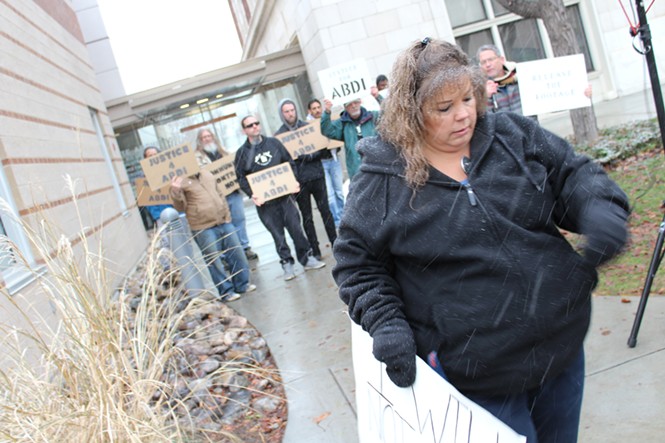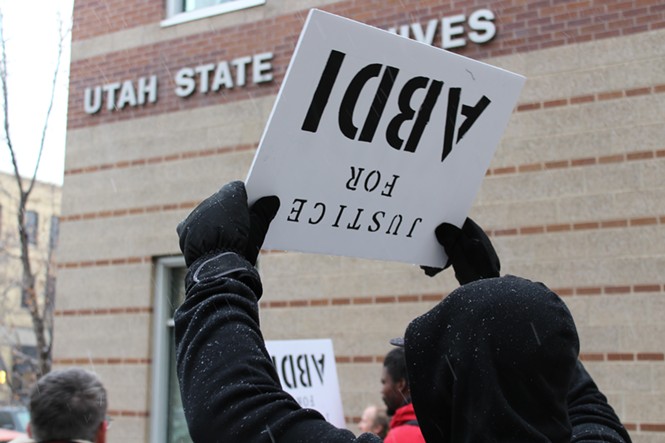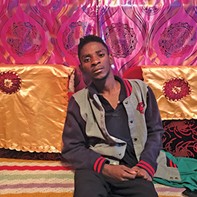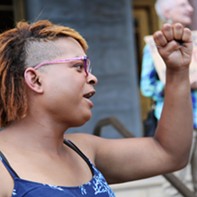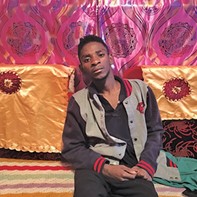Thursday, January 12, 2017
Decision Made on Abdi Mohamed Police-Cam Video
After 30-day appeals period, footage could see light of day.
Posted By Dylan Woolf Harris on January 12, 2017, 3:30 PM
The chants of picketers outside the State Archives Building Tuesday pierced through the walls where a records board was determining whether to release footage of a February police shooting.
The board ultimately decided four video recordings and a series of photo evidence depicting Salt Lake City police shooting then 17-year-old Abdi Mohamed are public.
District Attorney Sim Gill refused to give those documents to the public on grounds that it interfered with a criminal investigation, and later that it would taint a potential trial.
Mohamed is accused of beating a man with a pole on Rio Grande Street moments before he was shot by police. Mohamed has denied this characterization. In the DA’s evaluation, two police officers were exonerated for the shooting, and felony-equivalent charges were levied against the youth.
The public has not been privy to the footage, but a Police Civilian Review Board had access to the videos and ruled the police had not followed protocol.
Board chair Patricia Smith-Mansfield pointed out that the judicial procedure allows for the attorneys to weed out potentially biased jurors. Judges often ask jury pools whether they can fairly adjudicate cases, even if they have followed news of the alleged crime.
“I think they haven’t proven how it would affect a fair trial,” she told the deputy DA.
The DA’s office has about a month to file an appeal in district court. No footage is to be released until that appeal window has expired.
At Thursday’s State Records Committee hearing, the government was compelled to argue why the video footage should not be released to the public.
Deputy District Attorney Darcy Goddard offered the case that the video footage would compromise Mohamed’s ability to have a fair trial, should the case go to one. The footage could be released to the public, she added, at the conclusion of Mohamed’s criminal case.
“It’s the right of the judge as informed by the arguments of counsel how this evidence should be used in the course of that proceeding,” she said. “And once it is released to the public, made widely available on YouTube or all the local news stations, we think that could have a real undercutting effect on the judge’s authority to make evidentiary decisions.”
If the charges against Mohamed move forward in juvenile court to trial, though, it will be adjudicated by the judge, not a jury.
David Reymann, attorney representing the American Civil Liberties Union of Utah, laid out the case that the government had erroneously applied GRAMA law under the guise that it would deny Mohamed due process in the court.
Reymann argued that the role of body cameras on law enforcement is to keep a check on law enforcement when contentious and disputed confrontations occur.
“When we leave it to government officials to decide when and how and what to release rather than letting the public see the recordings that are recorded for this purpose, we don’t accomplish any of the goals that that technology is supposed to accomplish,” he said.
The ACLU says the footage should be public whether or not it reveals police were justified or whether or not it implicates Mohamed.
A Salt Lake County appeals board previously denied release of the footage.
About 30 minutes before the records committee heard the case, 15 or so protesters amassed outside the building—two blocks from where the shooting took place—and marched in an oval, calling for oversight and justice.
Demonstrator Jacob Jensen reasoned that the contradictory accounts of the shooting mandate its release.
“The community has a right to judge those things,” he said. “The police aren’t an occupying force. We are sovereign over the police. The police get a mandate to police from us.”
The protest continued for about 30 minutes after the hearing began. Reymann, noting the noise, said it was evidence of the public’s desire to see the truth.
More by Dylan Woolf Harris
-
Dabakis Is Leaving the Building
Ever boisterous and outspoken, state senator says lending liberal voice trumps his bill tally.
- Apr 4, 2018
-
Gagged and Bound
Row between South Salt Lake and muralist gets the burlesque treatment.
- Mar 21, 2018
-
Inland Port Authority Update
Gov. Herbert signs contested bill into law.
- Mar 16, 2018
- More »


